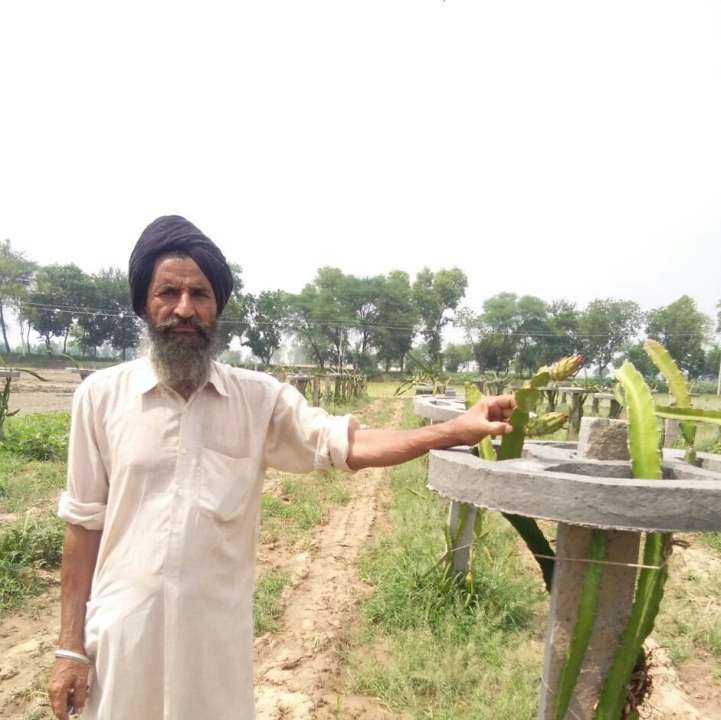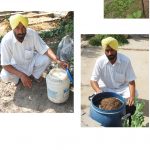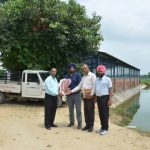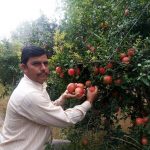Young Farmer Leading His Way By Adopting New Crop & Modern Farming Practices
In our country, farmers are more leaned towards conventional farming, but this practice does not provide expected profit as per the hard work. But, a swift shift has been encountered among the farmers of young generation.
It is observed that youngsters are adopting new farming patterns and techniques and they are giving preference to vegetable and fruit farming above conventional practices. And as we know those who dare to think and do different, only they can make a big change.
This is a story about one such young farmer, Amandeep Singh Sarao, who is cultivating a crop about which earlier he had no idea. He has gained a new identity in the society, with his hard work and passion.
Mansa (Punjab) based Amandeep Singh’s grandfather and father had bought many land pieces for their personal business interests. But due to lack of time, they rented their 32 acres of land to another farmer, on which conventional farming practices were being followed. He was not much influenced towards agriculture in the beginning, as there was not much farming work at home.
After completing his graduation, Amandeep visited Gujarat with his friends for outing. There, he visited a farm. His friends find that farm very odd, so he decided to go inside the farm and explore it. He discovered that it was a dragon fruit farm by the name GDF.
Very few farmers in our country know about dragon fruit, as it is a foreign fruit and that’s why Amandeep too did not know much about it. GDF farm’s owner Nikunj Pansuriya briefed him more about its farming. After coming back to Punjab, he consulted with his family about it and they praised their son that he has decided to do something different from the usual. Social media was the main source of information for him about the dragon fruit farming and he came to know many new things about it.
“After visiting GDF farm, Lakshmi Putra Dragon Fruit Farm and RK Dragon fruit farm, Vasupujya Dragon Fruit Farm, Shri Hari Horticulture Nursery, Sangar Nursary, I realized that our farmers have been stuck in the cycle of conventional farming from the beginning. Therefore, it’s time for the new generation to do something innovative in the field of agriculture. ” – Amandeep Singh Sarao
Through the internet, he came to know that in Punjab, a Barnala based farmer Harbant Singh Aulakh is also practicing dragon fruit farming. So, to gather more information he visited his farm and from there he felt encouraged & determined to start this new venture.
Amandeep took back 2 acres from the rented land. With the advice of GDF’s owner he get the poles ready and ordered plants from four different places. He named his farm – “Sarao Dragon Fruits Farm” and whenever he faced any difficulty, he took help from experts and internet. In the beginning, he planted red and white variety of dragon fruits.
As it is said that “Things which are happening around you are noticeable and does not require evidence or proof”, in the same way, first year’s fruit of Sarao Dragon Fruits Farm were very tasty and everybody relished it.
After starting dragon fruit farming, all my family members encouraged me and inspired me to work harder and then I never looked back. ” – Amandeep Singh Sarao
Amandeep’s sister-in-law, Harmandeep Kaur, works in the forest department and she advised him to grow sandalwood along with the Dragon Fruit. In our country, sandalwood has its own importance, as it is used for religious activities and its prices are also very high. So, he started collecting information about sandalwood farming.
Amandeep contacted and met Mr. Nitin Patel, the head of Chandan Vikas Association, Gujarat. Nitin Patel has about 2000 sandalwood plants at his farm. In the beginning, Amandeep took a few sandalwood seedlings to plant it on his farm on trial basis. And today, Sarao Farm has about 225 sandalwood plants.
“Do not let the situation overcome you so that you lose courage, rather keep courage in such a way that the situation can be defeated.” – Amandeep Singh Sarao
As a young farmer, Amandeep always thought about doing something new. So he started grafting Dragon Fruit plants. For this, he took training from Mary Ann Passaul, who is from Tangum Philipine Island.
• Simple Red
Amandeep still gathers new information related to agriculture field and he has also installed drip irrigation system at his farm. Everybody nearby his village praises him because of his strong determination and hard work and many people visit his farm to know more about his farming techniques.
Message









